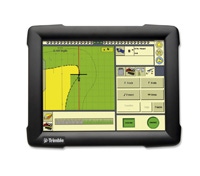March 24, 2011

After a decade of launching products in the geospatial realm, Trimble Agriculture announced a new course for the company at its Annual Resellers Meeting held in Loveland, CO, in January.
“This year the focus is on connectivity, which is important for bringing together all of the data collected in the field,” says Matt Hesse, sales manager for Trimble’s North America ag division. “The big question today is how do I make all of these devices work together. So our emphasis this year is to pull it all together to help drive better efficiency.”
In step with that focus, Trimble announced new products and features for 2011 that build on its Connected Farm system. This wireless data transfer system allows farmers to share data between the office, vehicles and workers in the field, eliminating the need for a USB stick or other storage device.
Multiuse modem
Trimble’smajor introduction this year was a new multiuse modem called the DCM-300. The modem can be used for data transfer of A-B lines, coverage maps, yield maps, field records and other important data. Other options include asset tracking, geo-fences, e-mail alerts and RTK corrections. One modem completely links the field to the farm office.
“This is my equivalent of the Apple iPhone for the moment,” says Ian Harley, business unit director for Trimble, as he holds up a black box with two ports.
He says one port allows you to connect to Trimble’s VRS Now Network to receive sub-inch GPS correction signals. The other port provides a wireless connection that allows transfer of data between the field and office over the Internet using either cellular service or WiFi.
The DCM-300 modem, part of Trimble’s Connected Farm solution, is designed to take the place of two modems to provide growers with a more cost-effective and faster wireless connection. Suggested modem list price is$1,895 for data transfer, asset tracking, and RTK corrections or $995 for just asset tracking. A data plan is required for an additional $600/year; however, the modem being used only for asset tracking includes a data plan. Data plans are available for either CDMA or GSM cellular networks such as AT&T and Verizon.
Vehicle-tracking software
The DCM-300 modem works with a new Farm Works solution called Dispatch. The software lets operators track vehicles and other assets in the field from their office. Vehicles equipped with a modem appear as icons on a display screen so managers can view vehicle location at all times.
“With this software you can actually see your vehicles move on screen in the office,” explains Brian Stark, marketing specialist for Farm Works Information Management, a division of Trimble. “You can use it to monitor vehicle location and manage fleets to improve fuel usage.”
The software has a geo-fencing feature that lets farm managers draw a virtual boundary around authorized work areas. If a vehicle of other tracked asset moves beyond that boundary, the farm manager is sent an e-mail alert so he or she can redirect the driver or help guard against theft. The price of the solution is $240/year for each asset.
Next-generation input control
At the event, Trimble also previewed new capabilities added to its crop input control system called Field IQ, launched in 2009. The original system controlled the application rates of seed and liquid nitrogen on up to 48 sections on planters and sprayers. The new system now can handle up to six products,including granular fertilizer and pesticides on platforms such as row-crop planters, air seeders and strip-till rigs.
“You now have the ability to control up to six control drives,” says Micah Eidem, product manager for Trimble’s flow and application group. “What that means is users who want to simultaneously control the flow of seed, liquid and granular products in six different combinations have that capacity.”
The new system also allows for the monitoring of implement performance so operators can tell when delivery systems are blocked or when crop inputs are being over- or under-applied. Planters, for instance, can be monitored for the number of seeds applied and quality of spacing on each individual row.
“With the new Field IQ system we can now do seed monitoring and singulation analysis to give growers useful information about how their planter is performing,” Eidem says. “Those are really the tools that operators use to make sure their seeding system is performing at the best level possible.”
The suggested list price for Field-IQ cab and implement kits starts at about $1,600. The list price for a Field-IQ ready Tru Count Meter Mount air clutch kit for a 16-row planter is $8,195. A LiquiBlock kit for the planter lists at $780. For more information,visit www.trimble.com/agriculture.
About the Author(s)
You May Also Like




